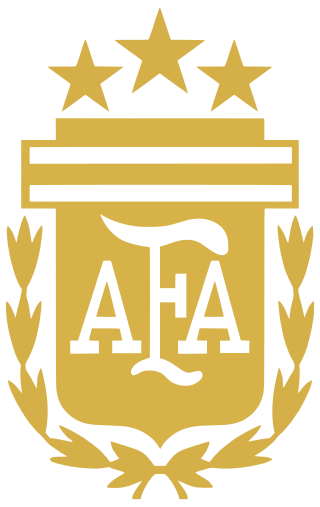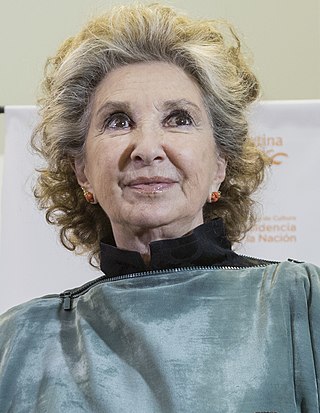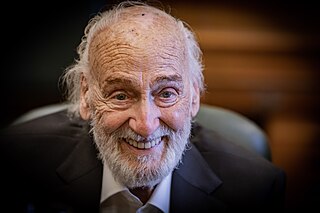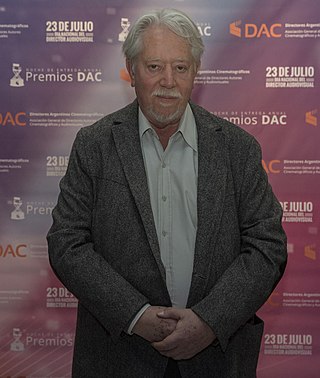
Diego Armando Maradona Franco was an Argentine professional football player and manager. Widely regarded as one of the greatest players in the history of the sport, he was one of the two joint winners of the FIFA Player of the 20th Century award, alongside Pelé.

The 1986 FIFA World Cup was the 13th FIFA World Cup, a quadrennial football tournament for men's senior national teams. It was played in Mexico from 31 May to 29 June 1986. The tournament was the second to feature a 24-team format. Colombia had been originally chosen to host the competition by FIFA but, largely due to economic reasons, was not able to do so, and resigned in November 1982. Mexico was selected as the new host in May 1983, and became the first country to host the World Cup more than once, after previously hosting the 1970 edition.

Carlos Gardel was a French-born Argentine singer, songwriter, composer and actor, and the most prominent figure in the history of tango. He was one of the most influential interpreters of world popular music in the first half of the 20th century. Gardel is the most famous popular tango singer of all time and is recognized throughout the world. Described variously as a baritone or tenor because of his wide vocal range, he was known for his rich voice and dramatic phrasing. Together with lyricist and long-time collaborator Alfredo Le Pera, Gardel wrote several classic tangos.

The Argentina national football team, nicknamed La Albiceleste, represents Argentina in men's international football and is administered by the Argentine Football Association, the governing body for football in Argentina.

The Official Story is a 1985 Argentine historical drama film directed by Luis Puenzo and written by Puenzo and Aída Bortnik. It stars Norma Aleandro, Héctor Alterio, Chunchuna Villafañe and Hugo Arana. In the United Kingdom, it was released as The Official Version.

Oscar Alfredo Ruggeri is an Argentine former professional footballer who played as centre-back. Nicknamed El Cabezón, Ruggeri achieved success at the international level with the Argentina national team, being part of the teams that won the 1986 FIFA World Cup, two editions of the Copa América and the 1992 FIFA Confederations Cup. At the club level, Ruggeri's most successful stint was with Argentine club River Plate, where he won the 1986 Copa Libertadores the 1986 Copa Interamericana and the 1986 Intercontinental Cup. Known for his rough style of play when marking opposing players and aerial ability, Ruggeri is considered one of the all-time best defenders to come out of Argentina. Following his retirement as a player, Ruggeri turned to managing, where he held posts in Argentina, Mexico and Spain. His last job as a manager was in 2006 with Argentine club San Lorenzo. Since then, Ruggeri went on to have a career on Argentine television, as commentator on football shows. He is currently a member of 90 Minutos de Fútbol, which airs on ESPN Argentina Latin America.

A sexploitation film is a class of independently produced, low-budget feature film that is generally associated with the 1960s and early 1970s, and that serves largely as a vehicle for the exhibition of non-explicit sexual situations and gratuitous nudity. The genre is a subgenre of exploitation films. The term "sexploitation" has been used since the 1940s.

Norma Aleandro is an Argentine actress. She is considered one of the most celebrated and prolific Argentine actresses of all time and is recognized as a cultural icon in her home country.

Héctor Benjamín Alterio Onorato is an Argentine theatre, film and television actor, well known both in Argentina and Spain.

Cinema of Argentina refers to the film industry based in Argentina. The Argentine cinema comprises the art of film and creative movies made within the nation of Argentina or by Argentine filmmakers abroad.
Latin American cinema refers collectively to the film output and film industries of Latin America. Latin American film is both rich and diverse, but the main centers of production have been Argentina, Brazil and Mexico. Latin American cinema flourished after the introduction of sound, which added a linguistic barrier to the export of Hollywood film south of the border.
This is an index to pages listing Argentine films ordered by year of release. For an A-Z list, see Category:Argentine films.

The cinema of Paraguay has historically been small. However, this has begun to change in recent years with films like El Toque del Oboe (1998); María Escobar (2002); O Amigo Dunor (2005), which competed for Best Movie in the Rotterdam International Film Festival; Hamaca Paraguaya (2006), which was screened at the Cannes Film Festival, gaining critical acclaim both in Paraguay and abroad; 7 cajas (2012); Latas Vacías (2014); and Luna de Cigarras (2014).

Héctor Olivera is an Argentine film director, producer and screenwriter. Olivera worked mainly in the cinema of Argentina, but also has directed or contributed to several films made for the United States market.

Luis Adalberto Puenzo is an Argentine film director, producer and screenplay writer. He works mainly in the cinema of Argentina, but has also worked in the United States.

Cocaine Wars is a 1985 Argentine-American action film directed by Héctor Olivera and starring John Schneider, Federico Luppi, Rodolfo Ranni and Royal Dano. It was written by Olivera, Steven M. Krauzer and David Viñas. The associate producer of the film was Fernando Ayala. It premiered in Argentina on June 25, 1985.

Enrique Carreras was a Peruvian-born Argentine film director, screenwriter and film producer. He was one of the most prolific film directors in the history of the cinema of Argentina and a prominent figure of the classical era of Argentine cinema.

A King and His Movie is a 1986 Argentine comedy drama film, directed by Carlos Sorín, and written by Sorín and Jorge Goldenberg. The movie features Ulises Dumont and Julio Chávez, among others.

Tangos, the Exile of Gardel is an Argentine-French film released on 20 March 1986, directed by Fernando Solanas, starring Marie Laforêt, Miguel Ángel Solá and Philippe Leotard. The film was selected as the Argentine entry for the Best Foreign Language Film at the 59th Academy Awards, but was not accepted as a nominee.